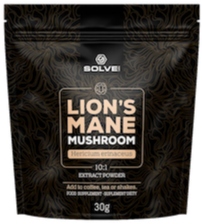Lion's Mane mushroom - properties, effects, opinions + top products
Lion's Mane is a popular mushroom for coffee or drinking on its own. We check if it's worth trying.


Learn more about our editorial process
.

Learn more about our editorial process
.

Learn more about our editorial process
.

Learn more about our editorial process
.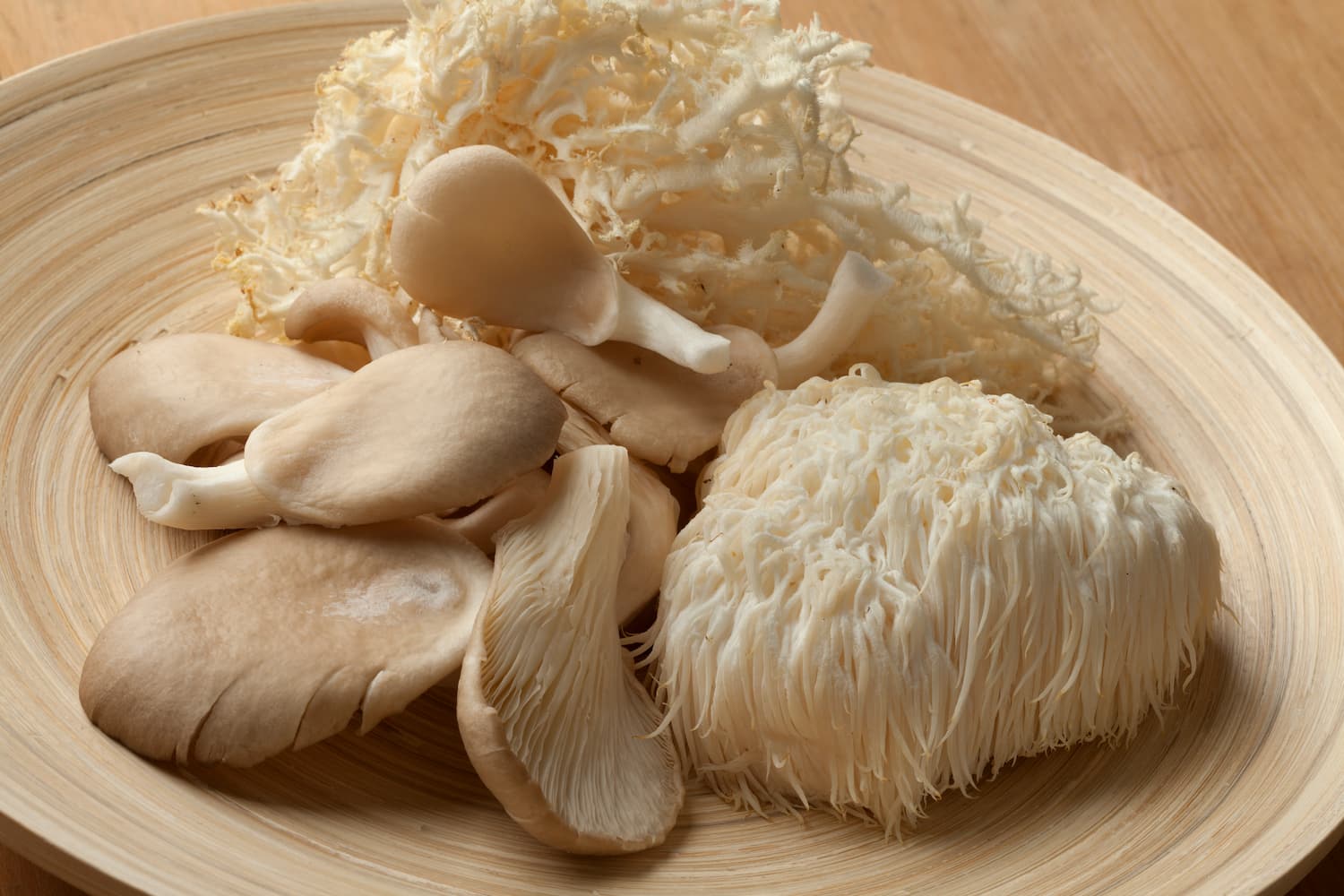
Why you can trust us
Articles on Natu.Care are written based on scientific research, data from government websites and other reliable sources. The texts are written in cooperation with doctors, nutritionists and other health and beauty experts. Articles are reviewed before publication and during significant updates.
.Learn more about our editorial process
.Information about advertisements
Content on Natu.Care may contain links to products from the sale of which we may receive a commission. When creating content, we adhere to high editorial standards and take care to be objective about the products discussed. The presence of affiliate links is not dictated by our partners, and we select the products we review ourselves completely independently.
.Learn more about our terms and Conditions
.When we were just getting used to adaptogens like ashwagandha, mushrooms with similar properties appeared on the market like rain. And the lion's share of the shelves was taken up by Lion's Mane.
With Ilona Krzak, MSc in Pharmacy, we have taken scientific research and product formulations under the microscope. Let's see what you can actually count on and what limitations we encountered in the data.
From this article you will learn:
- What properties Lion's Mane has.
- How to take adaptogens.
- How to take adaptogenic mushrooms. .
- After how long you will feel the effects. .
- What are the recommended vital mushroom products. .
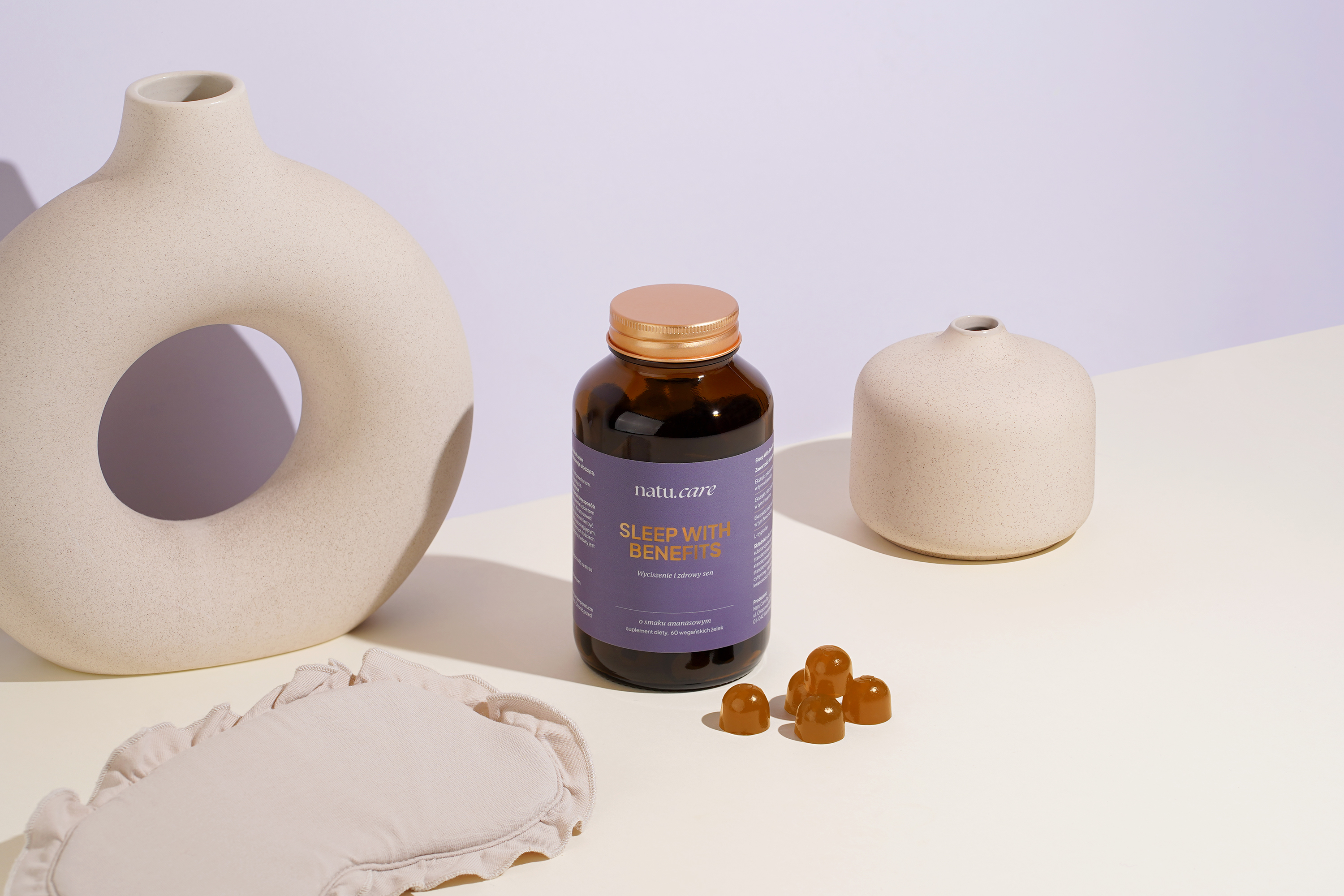
Sprawdź, za co pokochały go tysiące klientek Wegańskie żelki na sen, Ashwagandha KSM-66, ananas. -15% z kodem BLOG15
Wegańskie żelki na sen, Ashwagandha KSM-66, ananas
Wreszcie się wyśpisz! Wegańskie żelki na sen z najwyższej jakości ashwagandhą KSM-66®, ekstraktami ziołowymi i tryptofanem utulą Cię do snu.
Zobacz cenę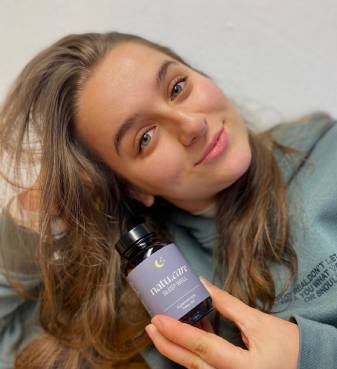
Bez problemu wstaje rano z budzikiem, co wcześniej się nie zdarzało, mam więcej energiiEwa Szczapinska
See also:
What is Lion's Mane?
.
Lion's Mane (Latin Hericium erinaceus) is a genus of parasitic fungus with adaptogenic properties in the soprano family. Lion's Mane in Polish means 'lion's mane', but in Poland it is known by the name soplówka hedgehog.
Both names you will fully understand by looking at the photo below -
.
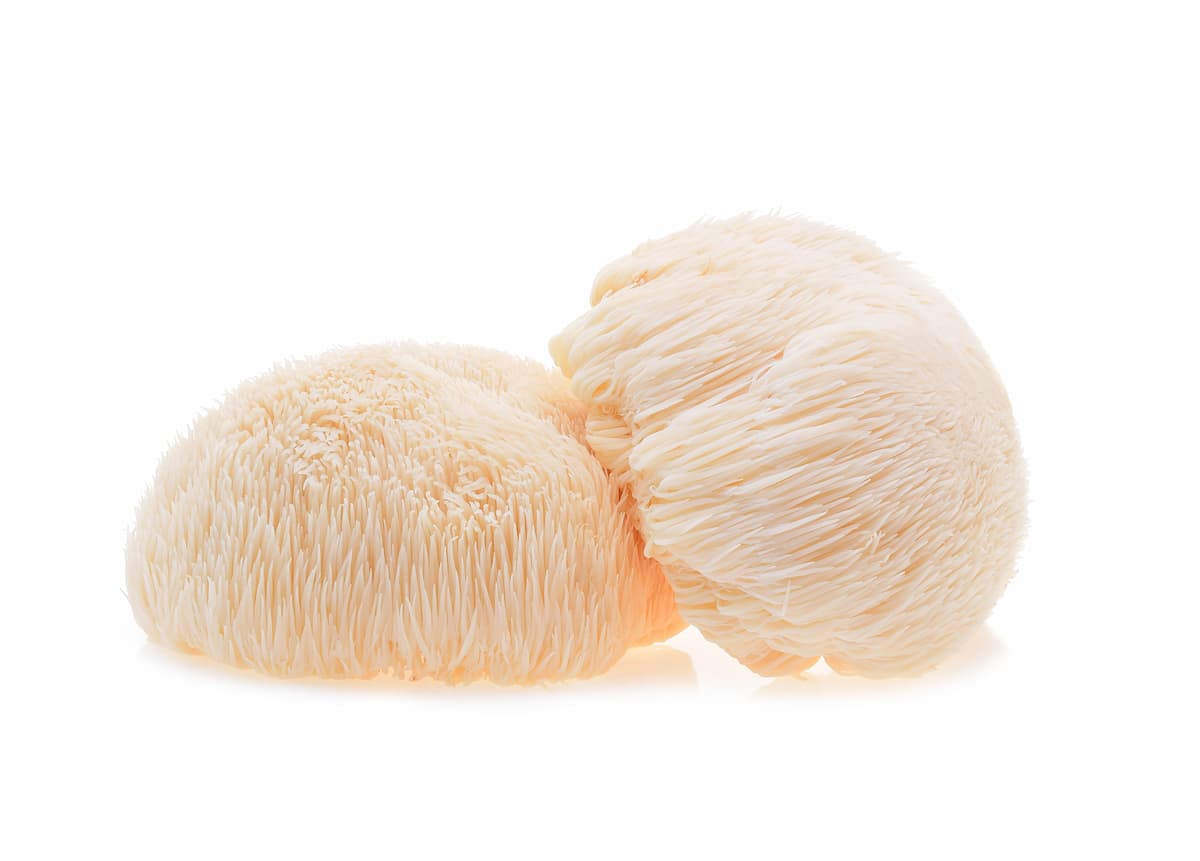
The spherical white fruiting bodies are covered with soft "icicles" and look like a fluffy mane that you just want to stroke.
White fruitcakes with a spherical form are covered with soft "icicles" and look like a fluffy mane that you want to stroke.
It has been used in Eastern medicine for several thousand years for its protective properties on the nervous system, immune support, reduction of inflammation and improvement of well-beingand. It belongs to the groups of so-called 'vital mushrooms' along with reishi, chaga and shitake, among others .
Lion's Mane contains numerous bioactive compoundsand:
.
- β-glucan polysaccharides, .
- amino acids, .
- antioxidants, .
- flavonoids, .
- sterols, .
- erinacins (substances responsible for the functioning of the nervous system), .
- hericenones - (compounds that support the production of nerve growth factor).
These are responsible for the potentially beneficial health properties of the mushroom.
Lion's Mane grows naturally in forests around the world, particularly in Asia, Europe and North America. In Poland, it is included on the red lists of endangered mushroom species due to its rarity. It usually grows on dead trees such as oak, maple or pineand.
For the wolf's appetite. Or even... lion's!"
Lion's Mane are edible mushrooms widely used in Asian cuisine. They are slightly sweet and resemble crab meat in taste. They taste good blended with beverages, but also in the form of roasts, pasties, soups and cakes.
Lion's Mane is an edible mushroom.
Does this mushroom even work?
.
Unfortunately, there are few scientific studies involving humans that show strong evidence for the health-promoting effects of Lion's Mane. Most of the researchers' work is rodent studiesand. Their results, which you will read about below, are promising, but unfortunately - a single study on a small group of humans is not enough.
So you ask - but what about Eastern medicine and its practices? In China, for example, adaptogenic mushrooms are used in hospitals on a daily basis to treat many ailments. I asked medical doctor Witold Tomaszewski for his opinion.
.
Eastern medicine differs from European medicine in many ways, not only culturally but also medically. Their medicine is more than 5,000 years of tradition. It looks at the patient in a completely different way, with issues of energy and internal balance and the use of herbal medicine..
 .
.
Witold Tomaszewskidoctor of medical sciences
."Remarkably, the two ethnic groups also differ in terms of metabolism, which can affect body composition, health and susceptibility to disease," the doctor adds.
Interesting study
One study compared metabolism between people of Asian and European descent. The results showed that Asians tend to have lower glucose tolerance and fat accumulation around the liver, which increases the risk of metabolic diseases such as diabetes and heart diseaseand.
And will you feel the lion's share? You'll have to find out for yourself. Read what Lion's Mane helps with.
.
Lion's Mane properties
.
According to scientific studies (mainly on animals), Lion's Mane mushroom potentially exhibits neuroprotective, anti-inflammatory, immune-stimulating properties and may protect the heart and digestive system. It may also have a positive effect on moodand. What does this look like in scientific research?
Lion's Mane potentially:
Provides support for the nervous system
.
Lion's Mane contains two compounds, hericenones and erinacins, which have been shown in in vitro and in vivo animal studies to have neuroprotective propertiesand. This means that they reduce neuronal damage and prevent diseases of the nervous system .
A 2020 study involving 41 patients with Alzheimer's disease suggests that taking 1g of Lion's Mane extract for 49 weeks improves cognitive test scores compared to placebo .
Alzheimer's is an irreversible brain disease in which the cerebral cortex shrinks, causing damage to areas responsible for thinking, planning and memory..
 .
.
Witold Tomaszewskidoctor of medical sciences
.Research in mice from 2016 suggests that 'lion's mane' extract may reduce symptoms of memory loss and prevent neuronal damage caused by amyloid-beta plaques that accumulate in the brain during Alzheimer's diseaseand.
Rat studies from the same year suggest that Lion's Mane extract can accelerate neuronal regeneration after nervous system injury .
.
Reduces inflammation
.
Inflammation is the body's defence response to injury, infection or other types of damage to cells and tissues. It is important that the body defends itself, but such a chronic condition can cause the development of many diseases, such as autoimmunity or cancerand.
Lion's Mane contains anti-inflammatory and antioxidant bioactive ingredients that can reduce inflammation and reduce the negative effects of the condition on the bodyand.
.
Several animal studies from 2013-2016 suggest that extract from this mushroom can reduce markers of inflammation and oxidative stress in rodentsand. Consumption of the extract has been shown to be useful in the treatment of inflammatory bowel disease, liver damage and strokeand.
The most important anti-inflammatory compound of Lion's Mane is amycenone. It belongs to the nootropics group and has the potential to positively influence neurotransmitter levels..
 .
.
Ilona Krzak Master of Pharmacy
Fungus vs fungus
In 2012, a scientific study compared the antioxidant capacity of 14 mushroom species. Lion's Mane came in fourth place, just behind reishi (Ganoderma lucidum), common cleome (Schizophyllum commune) and oyster mushroom (Pleurotaceae).
.
Improves immunity
.
Immunity, or your body's defence shield, is 70% located in the gutand. Lion's Mane increases the activity of 'good bacteria', which can support the proper functioning of the immune system.
The gut is our 'second brain'. The gut and brain are connected by the vagus nerve and through it these organs come into contact. Adequate gut flora means not only better immunity, but also better wellbeing. Up to 90% of serotonin comes from the gut..
 .
.
Ilona Krzak Master of Pharmacy
These properties were tested on mice given a lethal dose of Salmonella bacteria. The results suggest that systematic intake of Lion's Mane extract almost quadrupled the life span of the miceand.
Protects against ulcers
.
Protects against stomach ulcers - a 2016 scientific study involving people with ulcerative colitis suggests that taking 14% Lion's Mane extract reduces unpleasant symptoms of the disease and improves quality of life .
Unfortunately, patients with Crohn's disease included in the same study did not experience positive effects .
.
Gastric ulcers are often the culprit of the pathogenic bacterium Helicobacter pylori. It causes inflammatory changes in the gastric mucosa, which manifests as discomfort, pain and suffering for the patient. In vitro studies suggest that Lion's Mane extract can inhibit the growth Helicobacter pylori and protect the stomach lining from damageand.
Promotes wellbeing
.
Mental health is being talked about more and more. Up to a third of people in the developed world will experience depression and other mental health problems . This is the number of sufferers we know about and how many we don't know about
.
The interest in natural remedies to support wellbeing is not surprising. Studies in rodents suggest that Lion's Mane extract has anti-inflammatory effects that can reduce symptoms of anxiety and depression .
Mental state in mice is characteristically assessed by observing behavioural changes in mice. For example, a mouse that is stressed and full of anxiety has a prolonged period of immobility ('freezing'). When Lion's Mane extract is ingested, the time of this state is reduced.
Motivation, emotional state and cognitive function are often tested in rodents in a forced swim testand. Mice given Lion's Mane extract for 4 weeks stayed afloat longer, which may indicate a greater willingness to survive .
Unfortunately, we will not ask mice about their mood and their actual wellbeing, but there is one noteworthy study involving humans.
A 2010 study examined the effects of a fungus on the mood of menopausal women. Twenty-six women were divided into two groups. One received cookies with a placebo and the other with Lion's Mane extract. After four weeks, the subjects consuming the mushroom reported reduced feelings of irritability and anxietyand.
Reduces risk of heart disease
.
Scientific research suggests that Lion's Mane extract may affect some of the factors that contribute to heart disease. Obesity, high cholesterol and cardiovascular problems can lead to heart attack, stroke, atherosclerosis and other serious diseasesand.
Research with rodents suggests that Lion's Mane:
- prevents oxidation of cholesterol in the blood, .
- improves fat metabolism, .
- lowers triglycerides and blood sugarand. .
Oxidised cholesterol molecules tend to settle on artery walls, causing them to harden and increase the risk of heart attack and stroke..
 .
.
Witold Tomaszewskidoctor of medical sciences
.In one study, rats were fed a high-fat diet and given Lion's Mane extract at the same time. After 28 days, the rats had 27% lower triglycerides and 42% less weight gainand.
Experts indicate that more than half of Poles have excessively high cholesterol. Unfortunately, many don't know this because they don't do blood tests. And do you know what kind of cholesterol you have?
.
Destroys cancer cells in vitro
.
In in vitro studies, Lion's Mane extract mixed with cancer cells in a test tube causes their faster deathand. "Coming out of the test tube" showed similar properties in a study on colon cancer mice. An extract from this fungus reduced the spread of cancer to the lungs by 69% .
And further there is nowhere for it to "come out". - no human studies. We don't know how the extract affects cancer in the human body, so approach with caution the declarations of some manufacturers who are keen to mention the anti-cancer properties of this mushroom.
What powers does Lion's Mane conceal?
.Other potential properties of Lion's Mane include improved memory and concentration, positive effects on sleep quality and accelerated wound healingand. Unfortunately, there is also too little good quality research in these areas.
Is it worth it or not?
.
The above studies may have surprised you - rats were fattened and scared, and women were given cookies. As you can see, the scientific literature here is still at an early stage. Given that there are no indications yet that Lion's Mane supplementation would be harmful, it is best to see for yourself whether Lion's Mane will awaken the lion in you.
The popularity of adaptogenic mushrooms is growing - and for good reason. While we in Poland are just learning to drink coffee with them, in Asia, gourmet recipes are being created, mushroom creams are being spread, and even teeth are being brushed with them. Not to mention serving them to patients in hospitalsand.
Try. Not sure how, with what or when? Read on.
.
Dosage
.
The most commonly recommended daily dosage is 500 to 3000 mg Lion's Mane extract per day. Do not exceed 3,000 mg in a daily serving, as the effects of higher amounts of the extract on the human body are unknownand.
Various portions have been used in scientific studies, but the range mentioned appears to be safe and well tolerated . Consumption is best divided into 2-3 servings throughout the day, ensuring the body has continuous access to the active ingredients.
Lion's Mane in the morning or evening?
.
Lion's Mane is best taken in the morning until early afternoon (until around 2pm). This gives the fungus a chance to 'kick in' and gradually release the active ingredients throughout the day.
Make sure you are systematic - it is key. You can take 3,000 mg every few days and it will be less effective in its effects than, say, 1,500 mg a day. Establish consistent times of consumption and stick to them.
How long to take Lion's Mane?
.
Lion's Mane mushrooms are best taken daily for a minimum of 4 weeks in a daily serving of 1500 mg. Adaptogenic mushrooms take time to take effect and regularity is key.
Scientists do not clearly indicate if and when breaks should be taken while taking Lion's Mane. However, as a precaution, some fungotherapy or phytotherapy specialists (these are natural methods of supporting the body) recommend a minimum weekly break in the consumption of this fungus every few weeks.
When will I see results?
.
It's understandable - you are taking mushrooms and would like to feel the effects straight away. According to scientific studies, you have to wait about 4 weeks for an improvement in mood, for a change in health parameters (e.g. a reduction in cholesterol) four to six weeks, and for an improvement in the functioning of the nervous system even some monthsand.
Responding to the effects depends on your expectations and the problem you are facing. And remember, if you don't notice an improvement and the problem persists, contact your doctor.
Contraindications
.
Contraindications to the use of Lion's Mane includeand:
.
- pregnancy, .
- breastfeeding, .
- age under 18 years old,
- exposure to food or drink,
- allergy to glycerol,
- allergy to fungi or susceptibility to allergies, .
- planned surgery, .
- .
If in doubt - consult your doctor.
- .
Side effects
- .
Side effects from consuming Lion's Mane are rareand. They usually occur when the person consuming it has an allergy or does not follow the manufacturer's recommendations.
The most common side effects areand:
- gastrointestinal complaints (abdominal pain, nausea), .
- allergic reactions, .
- interactions with medications (anticoagulants and immunosuppressants).
- interactions with medications (anticoagulants and immunosuppressants).
- .
No negative side effects have been observed in humans in scientific studies when using doses that are currently available from manufacturers of mushroom preparations.
No adverse effects have been reported in humans after oral ingestion of Lion's Mane extracts at a cumulative dose of 1650 g/day - 80% bulk mycelium and 20% fruiting body extracts..
 .
.
Ilona Krzak Master of Pharmacy
Recommended products
- .
SOLVE LABS Collagen Peptides
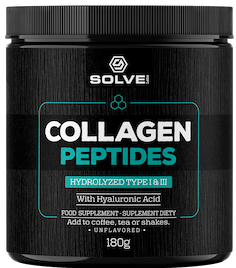
- Collagen content: 6000 mg hydrolyzed beef collagen type I and III COLLinstant® .
- Additional active ingredients: hyaluronic acid
- Form: powder .
- Dose: one scoop (6 g) daily .
- Sufficient for: 30 days .
Product description
High quality hydrolysate of bovine collagen (types I and III). A daily portion will support jointóry, bone and muscle health. It will also contribute to the quality and appearance of your skinóry and support its regeneration. You will feel the moisturising properties on soft hair and see them on a nice nail plate.
.Pros and cons
High quality hydrolysate of bovine collagen (types I and III). A daily portion will support jointóry, bone and muscle health. It will also contribute to the quality and appearance of your skinóry and support its regeneration. You will feel the moisturising properties on soft hair and see them on a nice nail plate.
.Additional information
High quality hydrolysate of bovine collagen (types I and III). A daily portion will support jointóry, bone and muscle health. It will also contribute to the quality and appearance of your skinóry and support its regeneration. You will feel the moisturising properties on soft hair and see them on a nice nail plate.
.User review
High quality hydrolysate of bovine collagen (types I and III). A daily portion will support jointóry, bone and muscle health. It will also contribute to the quality and appearance of your skinóry and support its regeneration. You will feel the moisturising properties on soft hair and see them on a nice nail plate.
.LION'S MANE, Hedgehog fungus
Product description
Sopl’s Mane will work well for people who’re in need of a natural boost and motivation during daily tasks. If you’re physically or mentally active, Lion’s Mane will have a positive effect on your energy, motivation and can influence your well-being.
Lion’s Mane shows the potential to support immunity, reduce inflammation and support nervous system recovery.
Pros and cons
Sopl’s Mane will work well for people who’re in need of a natural boost and motivation during daily tasks. If you’re physically or mentally active, Lion’s Mane will have a positive effect on your energy, motivation and can influence your well-being.
Lion’s Mane shows the potential to support immunity, reduce inflammation and support nervous system recovery.
Additional information
Sopl’s Mane will work well for people who’re in need of a natural boost and motivation during daily tasks. If you’re physically or mentally active, Lion’s Mane will have a positive effect on your energy, motivation and can influence your well-being.
Lion’s Mane shows the potential to support immunity, reduce inflammation and support nervous system recovery.
User review
Sopl’s Mane will work well for people who’re in need of a natural boost and motivation during daily tasks. If you’re physically or mentally active, Lion’s Mane will have a positive effect on your energy, motivation and can influence your well-being.
Lion’s Mane shows the potential to support immunity, reduce inflammation and support nervous system recovery.
{ product:3bloEbmZg808PUsEj4mBYt }}
{ product:q60O2lZaHVaFNdqc4heE6 }}
{ product:5a2Tc2Rtmvz4bSjD0U9fek }}
{ product:1Th4sm4aRoY1E2FGvGn5QS }}
How to choose the best Lion's Mane?
- .
You can choose from different forms of this mushroom: drinks, capsules, dried or raw mushroom. But - there are mushrooms and "mushrooms", i.e. standardised extracts or siano. When choosing a coneflower preparation, pay attention to several factors to choose the best quality product.
- Extract. A concentrated form, such as an extract, is 10 times more potent than the ground mushroom.
- The extract is the most potent form of the mushroom.
- Standardisation and DER. With these parameters, you know which raw material and the amount of the active ingredient - definitely not hay.
.
- Daily dose. Choose extracts with a daily dose of 1,500 mg - this is a frequently used dose in scientific studies.
.
Popular combinations of mushrooms and adaptogens
.
Scientific research suggests that synergistic effects between adaptogenic mushrooms may provide benefits that are not achieved by consuming them individuallyand. A mixture of mushrooms can have a more effective adaptogenic and tonic effect, as well as reducing stress, fatigue and stimulating the immune systemand.
Lion's Mane is liked with:
.
- chaga, .
- reishi, .
- cordyceps, .
- adaptogens, e.g. ashwagandha, rhodiola montana, .
Lion's Mane - expert opinions
.
Looking at the safety profile and potential therapeutic effects I am in favour. One of the suggested mechanisms of action of the active substances of the mushroom works antagonistically with the mechanism of dementia diseases - it abolishes the adverse effects that cause the disease. This is a very important aspect as dementia diseases are becoming more common..
 .
.
Ilona Krzak Master of Pharmacy
Lion's Mane is a mushroom known primarily for its neuroprotective properties, meaning it protects and supports brain function. It is excellent for improving cognitive function (e.g. short-term memory), but also for alleviating symptoms of depressed mood and sleep disorders. The effects of the mushroom are worth testing on yourself if you are struggling with any of the aforementioned conditions - you may find it helpful..
 .
.
Aleksandra Cudna-Bartnicka Clinical nutritionist
.
See also:
.
Summary
.
- Lion's Mane is a genus of parasitic fungi. In Poland, they are known as Hedgehog's sopod. .
- This fungus grows all over the world, with the greatest number in Asia, Europe and North America. It is under protection in Poland.
- There have been few scientific studies with humans that have tested the health effects of Lion's Mane. .
- Animal studies suggest that this mushroom may protect the nervous system, cardiovascular system, digestive system and microbiome, support immunity and mental health.
- The recommended daily intake is 1,500 mg of extract, divided into 2-3 servings. .
- The best preparations of Lion's Mane are standardised extracts. .
- It is generally safe to consume this mushroom. People who are allergic to the mushroom, those preparing for surgery, pregnant and lactating women, and children should be careful.
- Pregnant and lactating women should be careful.
FAQ
.What is the best Lion's Mane product?
.The best Lion's Mane product is Solve Labs Lion's Mane Mushroom Powder. It's a standardised 10:1 high quality extract that you can add to your coffee or favourite drinks. The formulation is simple, with no unnecessary additives or fillers and is suitable for vegans and vegetarians.
Where to buy Lion's Mane?
.Good preparations of Lion's Mane can be bought in stationary herbal shops or pharmacies (you can immediately check and evaluate the quality, appearance, smell) or online from manufacturers offering quality products, such as the shop Natu.Care.
What to combine Lion's Mane with?
.Lion's Mane can be combined with other mushrooms or adaptogens, as synergistic interactions between them can provide benefits that cannot be achieved by consuming them individually. A mix of mushrooms, for example, as in Kanaste Better Focus can have adaptogenic, tonic effects and reduce stress, fatigue and stimulate immune function.
Does Lion's Mane damage the kidneys?
.There is limited research on the specific effects of Lion's Mane (a.k.a.: lion's mane) on kidney health. This mushroom is generally considered safe to consume and has a long history of use in traditional medicine with no reported adverse effects on the kidneys. It is always advisable to consult your doctor before including any new dietary supplement, especially if you have a pre-existing kidney condition.
Does Lion's Mane stimulate?
.No, Lion's Mane does not stimulate, is not a stimulant (such as caffeine) and has no immediate stimulant or energy boosting properties.
Can Lion' Mane be given to children?
.Adaptogens and adaptogenic mushrooms should not be given to children under the age of 18, due to a lack of sufficient scientific studies on the safety of use in this age group.
Is it acceptable to drink alcohol while taking Lion's Mane?
.There is no direct evidence or research on the interaction between alcohol and Lion's Mane. However, it is recommended to avoid excessive alcohol consumption as this can have a negative impact on your overall health and well-being. In addition, alcohol may interfere with the absorption of the ingredients.
.
Sources
.See all
.Blagodatski, A., Yatsunskaya, M., Mikhailova, V., Tiasto, V., Kagansky, A., & Katanaev, V. L. (2018). Medicinal mushrooms as an attractive new source of natural compounds for future cancer therapy. Oncotarget, 9(49), 29259-29274. https://doi.org/10.18632/oncotarget.25660
Brandalise, F., Cesaroni, V., Gregori, A., Repetti, M., Romano, C., Orrù, G., Botta, L., Girometta, C., Guglielminetti, M. L., Savino, E., & Rossi, P. (2017). Dietary Supplementation of Hericium erinaceus Increases Mossy Fiber-CA3 Hippocampal Neurotransmission and Recognition Memory in Wild-Type Mice. Evidence-based Complementary and Alternative Medicine : eCAM, 2017, 3864340. https://doi.org/10.1155/2017/3864340
Chong, P. S., Fung, M.-L., Wong, K. H., & Lim, L. W. (2020). Therapeutic Potential of Hericium erinaceus for Depressive Disorder. International Journal of Molecular Sciences, 21(1), Article 1. https://doi.org/10.3390/ijms21010163
Diling, C., Chaoqun, Z., Jian, Y., Jian, L., Jiyan, S., Yizhen, X., & Guoxiao, L. (2017). Immunomodulatory Activities of a Fungal Protein Extracted from Hericium erinaceus through Regulating the Gut Microbiota. Frontiers in Immunology, 8, 666. https://doi.org/10.3389/fimmu.2017.00666
Gu, Y.-H., & Belury, M. A. (2005). Selective induction of apoptosis in murine skin carcinoma cells (CH72) by an ethanol extract of Lentinula edodes. Cancer Letters, 220(1), 21-28. https://doi.org/10.1016/j.canlet.2004.06.037
Haldar, S., Chia, S. C., & Henry, C. J. (2015). Body Composition in Asians and Caucasians: Comparative Analyses and Influences on Cardiometabolic Outcomes. Advances in Food and Nutrition Research, 75, 97-154. https://doi.org/10.1016/bs.afnr.2015.07.001
Kim, S. P., Kang, M. Y., Choi, Y. H., Kim, J. H., Nam, S. H., & Friedman, M. (2011). Mechanism of Hericium erinaceus (Yamabushitake) mushroom-induced apoptosis of U937 human monocytic leukemia cells. Food & Function, 2(6), 348-356. https://doi.org/10.1039/c1fo10030k
Kim, S. P., Moon, E., Nam, S. H., & Friedman, M. (2012). Hericium erinaceus mushroom extracts protect infected mice against Salmonella Typhimurium-Induced liver damage and mortality by stimulation of innate immune cells. Journal of Agricultural and Food Chemistry, 60(22), 5590-5596. https://doi.org/10.1021/jf300897w
Kim, S. P., Nam, S. H., & Friedman, M. (2013). Hericium erinaceus (Lion's Mane) mushroom extracts inhibit metastasis of cancer cells to the lung in CT-26 colon cancer-tansplanted mice. Journal of Agricultural and Food Chemistry, 61(20), 4898-4904. https://doi.org/10.1021/jf400916c
Kushairi, N., Phan, C. W., Sabaratnam, V., David, P., & Naidu, M. (2019). Lion's Mane Mushroom, Hericium erinaceus (Bull.: Fr.) Pers. Suppresses H2O2-Induced Oxidative Damage and LPS-Induced Inflammation in HT22 Hippocampal Neurons and BV2 Microglia. Antioxidants, 8(8), 261. https://doi.org/10.3390/antiox8080261
Li, G., Yu, K., Li, F., Xu, K., Li, J., He, S., Cao, S., & Tan, G. (2014). Anticancer potential of Hericium erinaceus extracts against human gastrointestinal cancers. Journal of Ethnopharmacology, 153(2), 521-530. https://doi.org/10.1016/j.jep.2014.03.003
Li, I.-C., Chang, H.-H., Lin, C.-H., Chen, W.-P., Lu, T.-H., Lee, L.-Y., Chen, Y.-W., Chen, Y.-P., Chen, C.-C., & Lin, D. P.-C. (2020). Prevention of Early Alzheimer's Disease by Erinacine A-Enriched Hericium erinaceus Mycelia Pilot Double-Blind Placebo-Controlled Study. Frontiers in Aging Neuroscience, 12, 155. https://doi.org/10.3389/fnagi.2020.00155
Nagano, M., Shimizu, K., Kondo, R., Hayashi, C., Sato, D., Kitagawa, K., & Ohnuki, K. (2010). Reduction of depression and anxiety by 4 weeks Hericium erinaceus intake. Biomedical Research (Tokyo, Japan), 31(4), 231-237. https://doi.org/10.2220/biomedres.31.231
Narayanan, M., Reddy, K. M., & Marsicano, E. (2018). Peptic Ulcer Disease and Helicobacter pylori infection. Missouri Medicine, 115(3), 219-224.
Nkodo, A. (2019). A Systematic Review of in-vivo Studies on Dietary Mushroom Supplementation for Cognitive Impairment (P14-021-19). Current Developments in Nutrition, 3, nzz052.P14-021-19. https://doi.org/10.1093/cdn/nzz052.P14-021-19
Panossian, A. G., Efferth, T., Shikov, A. N., Pozharitskaya, O. N., Kuchta, K., Mukherjee, P. K., Banerjee, S., Heinrich, M., Wu, W., Guo, D., & Wagner, H. (2021). Evolution of the adaptogenic concept from traditional use to medical systems: Pharmacology of stress- and aging-related diseases. Medical Research Reviews, 41(1), 630-703. https://doi.org/10.1002/med.21743
Reduction of depression and anxiety by 4 weeks Hericium erinaceus intake-PubMed. (n.d.). Retrieved June 19, 2023, from https://pubmed.ncbi.nlm.nih.gov/20834180/
Ryu, S., Kim, H. G., Kim, J. Y., Kim, S. Y., & Cho, K.-O. (2018). Hericium erinaceus Extract Reduces Anxiety and Depressive Behaviors by Promoting Hippocampal Neurogenesis in the Adult Mouse Brain. Journal of Medicinal Food, 21(2), 174-180. https://doi.org/10.1089/jmf.2017.4006
Sheng, X., Yan, J., Meng, Y., Kang, Y., Han, Z., Tai, G., Zhou, Y., & Cheng, H. (2017). Immunomodulatory effects of Hericium erinaceus derived polysaccharides are mediated by intestinal immunology. Food & Function, 8(3), 1020-1027. https://doi.org/10.1039/c7fo00071e
Sokół, S., Golak-Siwulska, I., Sobieralski, K., Siwulski, M., & Gorka, K. (2015). Biology, cultivation, and medicinal functions of the mushroom Hericium erinaceum. Acta Mycologica, 50(2), Article 2. https://doi.org/10.5586/am.1069
Subramaniam, M., Ng, C., Chong, S.-A., Mahendran, R., Lambert, T., Pek, E., & Huak, C. Y. (2007). Metabolic differences between Asian and Caucasian patients on clozapine treatment. Human Psychopharmacology, 22(4), 217-222. https://doi.org/10.1002/hup.842
Svensson, M., Brundin, L., Erhardt, S., Hållmarker, U., James, S., & Deierborg, T. (2021). Physical Activity Is Associated With Lower Long-Term Incidence of Anxiety in a Population-Based, Large-Scale Study. Frontiers in Psychiatry, 12. https://www.frontiersin.org/articles/10.3389/fpsyt.2021.714014
Szydłowska-Tutaj, M., Szymanowska, U., Tutaj, K., Domagała, D., & Złotek, U. (2023). The Addition of Reishi and Lion's Mane Mushroom Powder to Pasta Influences the Content of Bioactive Compounds and the Antioxidant, Potential Anti-Inflammatory, and Anticancer Properties of Pasta. Antioxidants, 12(3), Article 3. https://doi.org/10.3390/antiox12030738
The Role of Exercise in Preventing and Treating Depression: Current Sports Medicine Reports. (n.d.). Retrieved June 19, 2023, from https://journals.lww.com/acsm-csmr/fulltext/2019/08000/the_role_of_exercise_in_preventing_and_treating.6.aspx
Therkelsen, S. P., Hetland, G., Lyberg, T., Lygren, I., & Johnson, E. (2016a). Effect of a Medicinal Agaricus blazei Murill-Based Mushroom Extract, AndoSanTM, on Symptoms, Fatigue and Quality of Life in Patients with Ulcerative Colitis in a Randomized Single-Blinded Placebo Controlled Study. PloS One, 11(3), e0150191. https://doi.org/10.1371/journal.pone.0150191
Therkelsen, S. P., Hetland, G., Lyberg, T., Lygren, I., & Johnson, E. (2016b). Effect of the Medicinal Agaricus blazei Murill-Based Mushroom Extract, AndoSanTM, on Symptoms, Fatigue and Quality of Life in Patients with Crohn's Disease in a Randomized Single-Blinded Placebo Controlled Study. PLoS ONE, 11(7), e0159288. https://doi.org/10.1371/journal.pone.0159288
Trovato, A., Siracusa, R., Di Paola, R., Scuto, M., Ontario, M. L., Bua, O., Di Mauro, P., Toscano, M. A., Petralia, C. C. T., Maiolino, L., Serra, A., Cuzzocrea, S., & Calabrese, V. (2016). Redox modulation of cellular stress response and lipoxin A4 expression by Hericium Erinaceus in rat brain: Relevance to Alzheimer's disease pathogenesis. Immunity & Ageing : I & A, 13, 23. https://doi.org/10.1186/s12979-016-0078-8
Wang, G., Zhang, X., Maier, S. E., Zhang, L., & Maier, R. J. (2019). In Vitro and In Vivo Inhibition of Helicobacter pylori by Ethanolic Extracts of Lion's Mane Medicinal Mushroom, Hericium erinaceus (Agaricomycetes). International Journal of Medicinal Mushrooms, 21(1), 1-11. https://doi.org/10.1615/IntJMedMushrooms.2018029487
Wong, J.-Y., Abdulla, M. A., Raman, J., Phan, C.-W., Kuppusamy, U. R., Golbabapour, S., & Sabaratnam, V. (2013). Gastroprotective Effects of Lion's Mane Mushroom Hericium erinaceus (Bull.:Fr.) Pers. (Aphyllophoromycetideae) Extract against Ethanol-Induced Ulcer in Rats. Evidence-Based Complementary and Alternative Medicine: ECAM,
Wong, K.-H., Kanagasabapathy, G., Naidu, M., David, P., & Sabaratnam, V. (2016). Hericium erinaceus (Bull.: Fr.) Pers., a medicinal mushroom, activates peripheral nerve regeneration. Chinese Journal of Integrative Medicine, 22(10), 759-767. https://doi.org/10.1007/s11655-014-1624-2
Wulan, S. N., Westerterp, K. R., & Plasqui, G. (2010). Ethnic differences in body composition and the associated metabolic profile: A comparative study between Asians and Caucasians. Maturitas, 65(4), 315-319. https://doi.org/10.1016/j.maturitas.2009.12.012
.
Editorials
Meet the team

Ilona Krzak obtained her Master of Pharmacy degree from the Medical University of Wrocław. She did her internship in a hospital pharmacy and in the pharmaceutical industry. She is currently working in the profession and also runs an educational profile on Instagram: @pani_z_apteki

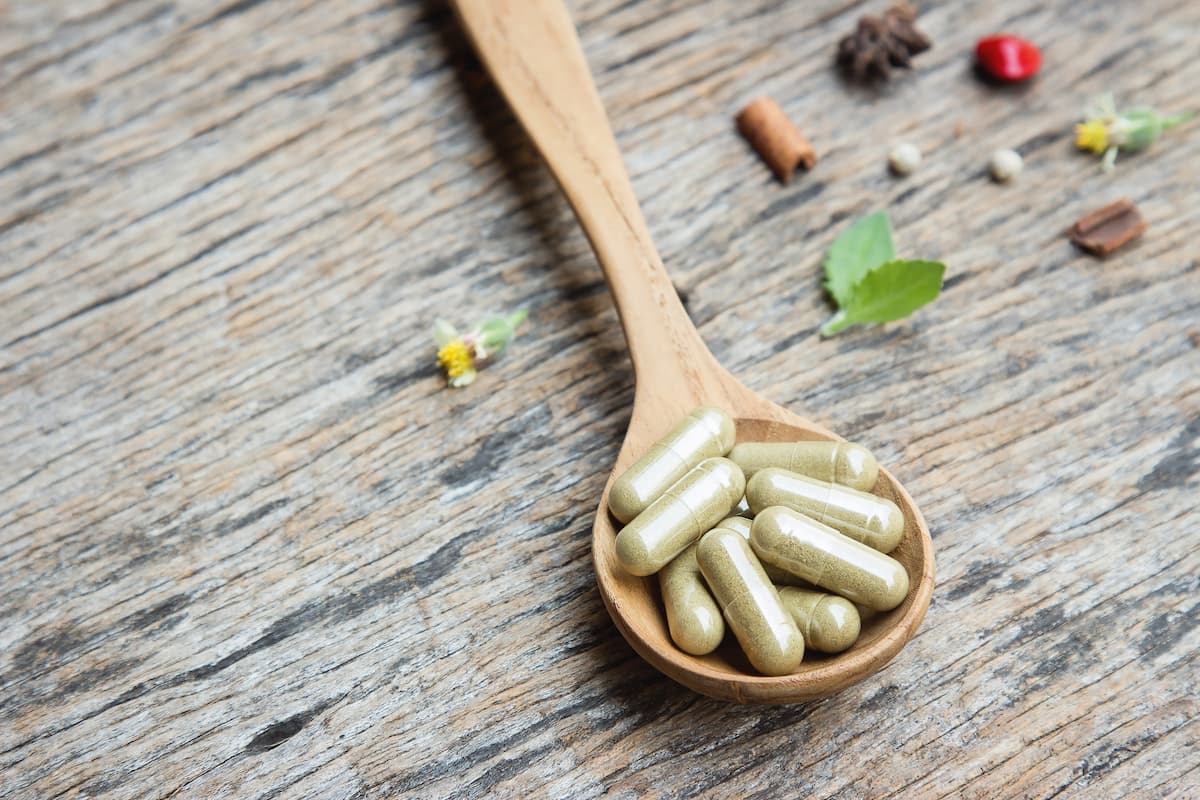
Ashwagandha affects thyroid hormone levels. Find out if you can use it.
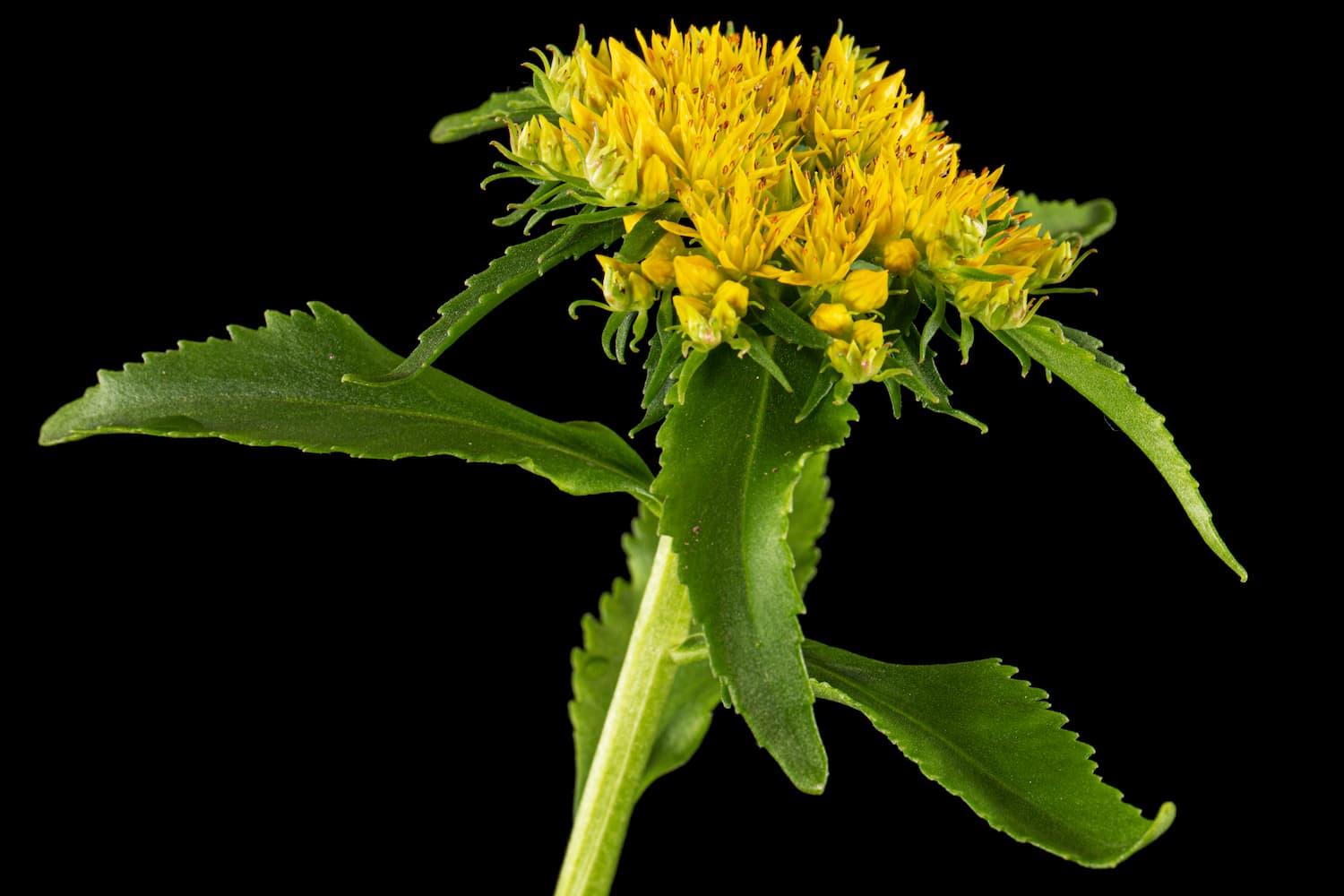
See how mountain pintail can affect your wellbeing.

Check out the opinions of doctors and other professionals about ashwagandha. Also find out what people on the forum think about it.
